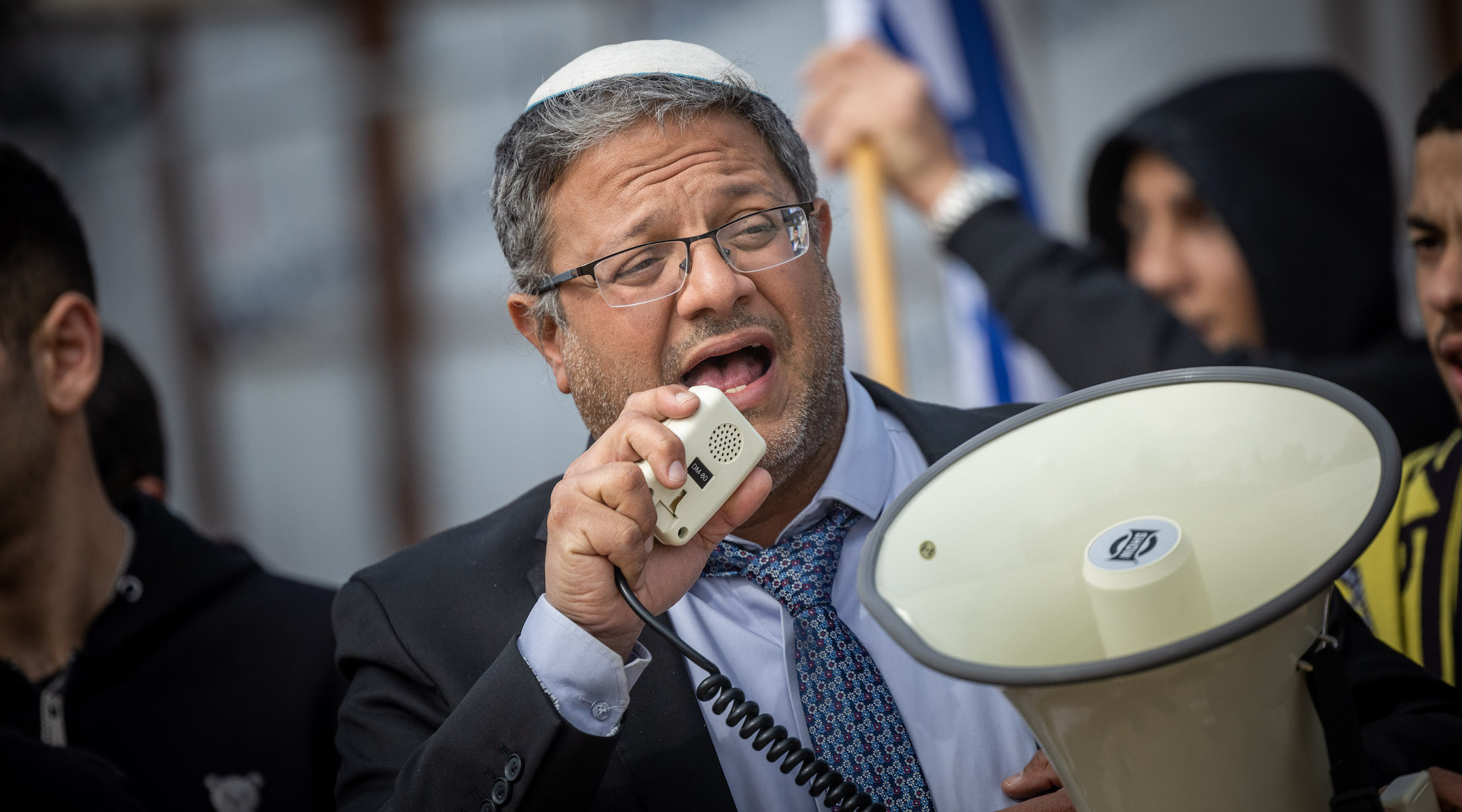Hundreds of US rabbis pledge to block extremists in Israeli government from speaking in their communities
A letter is a signal of a burgeoning crisis in relations between Israel and the U.S. Jewish community

Itamar Ben-Gvir and right-wing activists protest against a meeting with bereaved Palestinian families outside the Rene Kasen high school in Jerusalem, March 29, 2022. (Yonatan Sindel/Flash90)
(JTA) — More than 330 American rabbis, including some who occupy prominent roles in major cities, are pledging to block members of the Religious Zionist bloc in Benjamin Netanyahu’s new government from speaking at their synagogues and will lobby to keep them from speaking in their communities.
An open letter now circulating says they will not invite members of the bloc “to speak at our congregations and organizations. We will speak out against their participation in other fora across our communities. We will encourage the boards of our congregations and organizations to join us in this protest as a demonstration of our commitment to our Jewish and democratic values.”
Netanyahu announced his proposed new government including the Religious Zionists late Wednesday, although its details have yet to be finalized.
Israeli government ministers sometimes speak at American synagogues to drum up support for their initiatives and ideas. It’s not clear if figures who are harshly critical of non-Orthodox Jews, as Religious Zionist leaders have been, would accept invitations from their synagogues even if offered. Nevertheless, the letter’s uncompromising tone and the breadth of the signatories is a signal of a burgeoning crisis in relations between Israel and the U.S. Jewish community triggered by the elevation of the extremists, who won 14 seats in the Nov. 1 election.
Its signatories come from the Reform, Conservative and Reconstructionist movements. There are no Orthodox signatories.
Among the signatories are current and former members of the boards of rabbis in Chicago and Los Angeles; rabbis who lead the largest Conservative and Reform congregations in the Washington, D.C., area; former leaders of major Reform and Conservative movement bodies; the current leader of the Reconstructionist movement; and the rector of the Conservative movement’s Los Angeles-based American Jewish University. The letter was organized by David Teutsch, a leading Reconstructionist rabbi in Philadelphia, and John Rosove, the rabbi emeritus of Temple Israel in Los Angeles.
The letter outlines five Religious Zionist proposals that it says “will cause irreparable harm to the Israel-JewishDiaspora relationship”: changing the Law of Return to keep out non-Orthodox converts and their descendants; eroding LGBTQ rights; allowing the Knesset to override Supreme Court rulings; annexing the West Bank; and expelling Arab citizens who oppose Israel’s government.
How much of that agenda will make its way into governance remains to be seen. Netanyahu has said he is confident that he will be able to constrain some of the figures he plans to name to lead ministries.
Among these are Itamar Ben-Gvir, who has been tapped to control the police and who has been convicted of incitement over his past support of Israeli terrorist groups and inflammatory comments about Israel’s Arab population; Bezalel Smotrich, who has been accused by Israeli security forces in the past of plotting violent attacks against Palestinians, and who will supervise West Bank Jewish settlements; and Avi Maoz, who has described himself as a “proud homophobe” and has called all liberal forms of Judaism a “darkness,” and who will have authority over some aspects of education.
A number of U.S. Jewish groups spoke out against including the extremist faction in the government while Netanyahu was negotiating with the bloc, and more have done so since he announced the government’s formation on Wednesday. They include the Anti-Defamation League, the major non-Orthodox movements, and the liberal Jewish Middle East policy groups Partners for Progressive Israel, J Street and Americans for Peace Now.
Abe Foxman, the retired director of the ADL and a longtime bellwether of establishment Jewish support for Israel, said earlier this month that he is hopeful that Netanyahu can contain the extremists, but that “if Israel ceases to be an open democracy, I won’t be able to support it.”
Some organizations that spoke out in 2019 when Netanyahu considered a coalition with extremists were silent even as others sounded the alarm since the election, including the American Israel Public Affairs Committee and the Conference of Presidents of Major American Jewish Organizations. An AIPAC statement after Netanyahu’s announcement this week said, “Once again, the Jewish state has demonstrated that it is a robust democracy with the freedoms that Americans also cherish,” The Conference of Presidents has not issued a statement.
Orthodox groups have yet to pronounce on the new government. The Zionist Organization of America, which backs settlement building, has indicated it will support the new government.
The American Jewish Committee shifted its tone slightly from before the election, when it declined to speak out. In a statement after Netanyahu’s announcement, it sounded a note similar to Foxman’s, saying it would work with Netanyahu “to help ensure that the inflammatory rhetoric that has been employed by some members of the governing coalition — rhetoric unrepresentative of Israel’s democratic values, its role as a homeland for all Jews, and its unwavering quest for peace — will not define the domestic and foreign policies of the new government.”
The Biden administration has said that it will judge Israel’s government by its policies, not the individuals in Netanyahu’s cabinet.
This article originally appeared on JTA.org.















